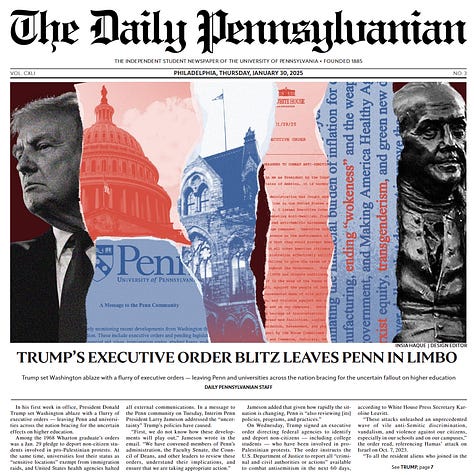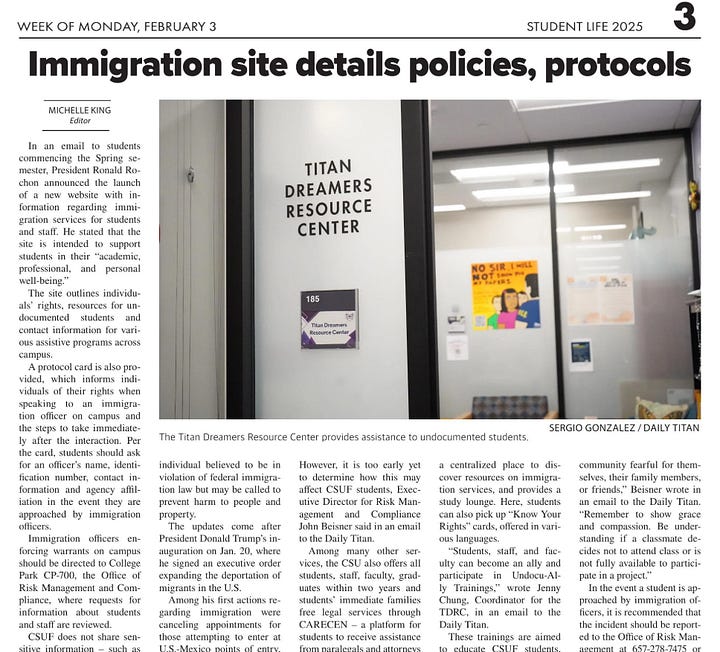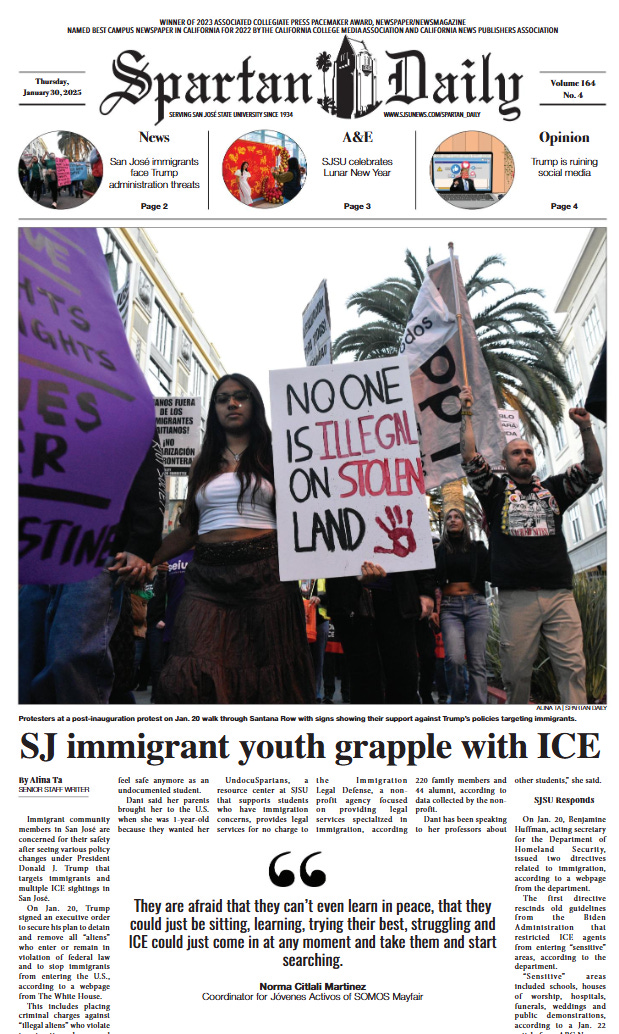Student journalists covering Trump’s orders: Here are some story ideas
From DEIA bans to immigration and international student issues

It’s been three weeks since President Donald Trump took office, and each news alert feels like another wave of uncertainty.
But that’s to be expected in our line of work. As journalists, it’s our job to stay on top of these developments, process the changes and explain their local impact.
That’s why I’m writing this issue: To help you brainstorm story ideas around Trump’s actions that you can localize for your campus community and beyond.
I spent last week looking through student newspapers and noticed that much of the coverage has focused on immigration enforcement, international students and bans on diversity, equity, inclusion and accessibility efforts.
Here are a few stories I found noteworthy:
The Muhlenberg Weekly reported that a Muhlenberg College student was “picked up by” U.S. Immigration and Customs Enforcement agents without asking for identification. The student was handcuffed, taken downtown, and later released, according to the report.
Keanna Peña, editor-in-chief, said the report sparked criticism of misinformation because of its lack of corroboration from town, university and police officials.
“But we know that this did happen,” Peña wrote in her editorial defending the report. “We have confirmed that this student was forcefully taken a few blocks from campus. This should not be labeled as misinformation, and it is an incident the student body should be aware of for their own safety.”
She explained ICE operates without a paper trail making it hard to verify and corroborate stories, the main issue in reporting on immigration.
At Purdue University, The Purdue Exponent moved to redact names, images and likenesses of pro-Palestinian students from every story published since Oct. 7, 2023.
This was in response to an executive order pushing universities to “monitor for and report” activities of international students for their antisemitic activities, with Trump pledging visa revocation and deportation.
“Further, in future coverage, no such information or images will be published online or in print by the Exponent — no exceptions — until this autocratic attack on free speech is overturned,” The Exponent’s editorial board wrote, calling the order “a blatant violation of the First Amendment rights.”
Responding to the same order, The Harvard Crimson called on Harvard University in its editorial to “proactively take every lawful step to defend the rights of its students.”
“Of course, the University should comport its behavior with the law,” the editors wrote. “But when faced with a choice between preemptive compliance and actions better suited to defending students, Harvard should err on the side of the latter.”





In Missouri, The Northwest Missourian reported that several universities, including Northwest Missouri State University, had dissolved their diversity offices.
The paper’s editor-in-chief and managing editor said their staff was asked to leave a student government meeting about the office’s closure, while students at the meeting were instructed not to speak with journalists.
“This is absolutely unacceptable and a blatant violation of our First Amendment rights,” they wrote. “Students were so afraid to talk to us while we stood asking if they would like to be interviewed; we were repeatedly told ‘I’m not comfortable with that’ after asking if they wished to share their opinions.”
At the University of North Carolina, law students had job offers rescinded due to a federal hiring freeze for civilian employees, The Daily Tar Heel reported.
In Arizona, The State Press at Arizona State University reported that the College Republicans were encouraging students to report “criminal classmates to ICE for deportations” and selling merchandise featuring “ICE Volunteer” text and the Department of Homeland Security logo.
These stories highlight some of the ways Trump’s policies are impacting college communities. I hope these inspire you to think about how you can localize similar issues for your own campus.
Keep asking questions — I’m rooting for you! Take a look below for more angles you can look into.
🚫 DEIA bans
Trump’s executive order prohibits race- and gender-focused programs within the federal government and directs agencies to combat “illegal private-sector” DEIA activities. Another order redefines sex strictly as male and female.
How are your university administrators responding to this?
Has your school issued any internal directives? Are there concerns about layoffs or program cuts?
How will the ban affect university recruitment, particularly in terms of outreach to underrepresented communities?
Have there been any visible changes to the school’s diversity programs or websites?
Are corporate partners, alumni or donors pushing back against or supporting DEIA cuts?
Many universities offer mandatory DEIA training for students, faculty and staff. How are these programs changing in response to the bans?
How has academic research been affected by these orders at your university?
Check out The Huntington News on internal instructions for faculty to cease DEIA-related research.
🌎 Immigrations and international students
Trump has ordered stricter visa vetting, rescinded policies on sensitive locations for immigration enforcement and pushed universities to monitor international students for antisemitic activities.
What is your school’s policy on complying with immigration enforcement agents?
How is this affecting international students’ mental health, academic performance or social integration on campus?
What do international students need to know about maintaining their legal status and their rights in the U.S.?
How are families of international students overseas reacting to the U.S.’s policies?
What do admissions offices say about the future outlook for international student enrollment?
Are they concerned about surveillance or their personal data being reported to federal authorities? How are universities addressing these concerns, if at all?
How are international students navigating their activism, especially when it comes to politically charged issues? Are they more hesitant to speak out?
How might the changes in immigration policy affect the U.S.’s global standing in education and research?
🏥 Gender-affirming care
Trump’s directive pressures hospitals receiving federal funding to end “chemical and surgical mutilation of children,” leading some university-affiliated hospitals to pause gender-affirming care.
Will gender-affirming care be impacted at your school’s health clinic?
Are faculty members or student organizations advocating for continued access to gender-affirming care on campus?
Are parents and students concerned about the legality and safety of pursuing care under these policies?
Is your university reviewing its insurance plans to comply with the new federal guidance, and how will this impact students' coverage?
What are your state laws on gender-affirming care? Can hospitals legally deny these services?
🏦 Funding freezes
The Office of Management and Budget froze funding for federal grants and loans, which was later blocked by a judge. Many institutions still rely on federal funding for research grants from agencies like the National Institutes of Health and the U.S. Agency for International Development, which was targeted for closure.
How much research funding does your school receive each year?
What does the freeze mean for ongoing projects and faculty members?
What are the long-term implications for these projects, and how are researchers pivoting to continue their work without federal support?
Have there been any plans for layoffs or furlough at your campus Feed The Future Innovation Labs, a USAID initiative?
While Pell Grants and financial aid programs may remain unaffected, could the potential freeze impact campus employment and work-study funding?
Some U.S. colleges receive USAID funding to provide online learning for foreign students overseas, too. How is this affected?
If you’re reporting outside of the U.S., how has the funding freeze impacted local students in your country?
For example, Voice of America reported that more than 400 Burmese students had their scholarships from the USAID abruptly canceled.
💰 Support for Hispanic, tribal schools
Initiatives aimed at supporting underrepresented student groups like those at Hispanic-serving institutions and tribal colleges and universities were rolled back on Trump’s first day.
How will this impact federal funding for these schools?
What does this mean for the people involved in these programs?
Can you interview someone who has benefited from these initiatives?
What efforts are being made to keep these institutions afloat or push for alternative funding sources?
HSIs and tribal colleges often serve as key educational pillars in their communities. How will the potential decline in funding affect the local economy?
💬 I want to hear from you! How has it been like the past few weeks? How do you process all the changes? Email me at nutgrafnews@gmail.com.
Story Spotlight:
💡 It’s been about a year since The Daily Iowan acquired two local weeklies. One of the publications, the Mount Vernon-Lisbon Sun’s editorial board said the experience has been all positive.
💰 University of Wyoming administrators rejected student government’s proposal to slash student media funding, only cutting 8.5% instead of the original 75%-cut proposal because students “don’t like” the Branding Iron’s coverage.
Editor-in-Chief Ven Meester told me in January: “We have had to develop a plan to essentially gut our department, eliminate any full-time positions, get rid of our print edition, and cut off any additional projects like our magazines.”
📝 Check out The Journalist’s Resource articles on things you need to know covering Trump’s tariffs and tips for journalists covering the Department of Education under Trump’s second term.
Featured Opportunities:
The National Association of Hispanic Journalists is hosting a webinar on advice for international student journalists Feb. 12.
Allrecipes is seeking a summer editorial intern in New York. Apply before Feb. 14.
Apply to multiple internship positions, including newsroom, special event and marketing, at St. Louis Public Radio before Feb. 16.
Voces Internship of Idaho is seeking Idaho students of Hispanic or Latino descent to apply for summer internships before Feb. 16.
KCUR's Aviva Okeson-Haberman Internship Program is accepting applications until Feb. 23.
The Latino News Network is accepting applications for the Hortencia Zavala Foundation Summer Internship Program. This is based in one of the four NPR’s Midwest Newsroom locations.
American Public Media is looking for a video production intern for June to December. The position’s open until filled.
The New England High School Journalism Collaborative is accepting applications for its paid summer workshop. Deadline’s April 4.
Applications open for New Hampshire’s largest student journalism award. Submit your entries before April 28.







